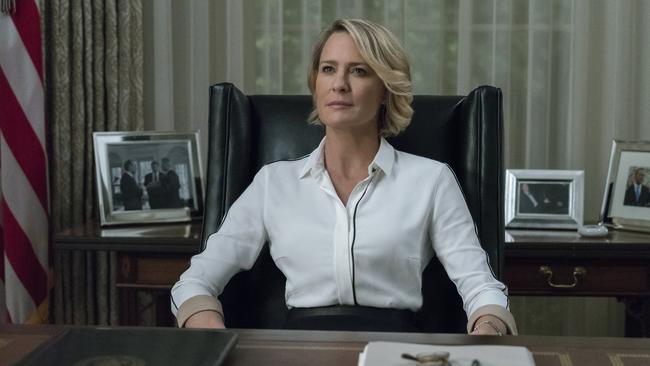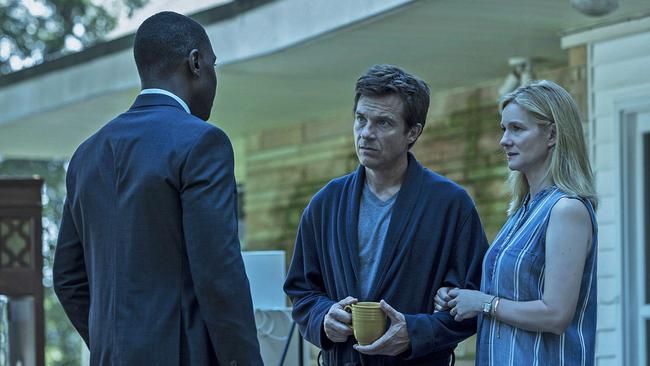Netflix is rotting our brains and our health
Netflix has revolutionised TV, but I can’t help feeling that lying in front of a screen for days at a time is destructive.

Last week I finally gave in to complaints from friends and family and got a new TV and I have got to say I’m underwhelmed.
Cowboy Builders is still just Cowboy Builders when viewed via 4K streaming. Ultra HD does not necessarily enhance the experience of watching Rick Stein eat a burrito.
Then there is Netflix, which I have avoided until now on the grounds that I could access it only via laptops.
I realise that questioning the value of the world’s largest videostreaming service in 2018 is like querying the innate cuteness of puppies. After all, this week its valuation passed $US100 billion for first time. Its shows account for more than a third of all prime-time download internet traffic in North America. My ultimate employer has sold a large part of his business to Disney because he seems to have accepted that he cannot compete with the threat of Netflix.
Is its mountain of original content as routinely brilliant as claimed, though? It is to be applauded for taking risks and generally making drama more adventurous and diverse, but so far I have given up on House of Cards, Ozark and The Crown because at some point all these acclaimed series turn into EastEnders. The initial episodes are always incredible, polished to within an inch of their lives, the TV equivalent of getting into a Porsche. There comes a point with each one, however, when the story becomes ludicrous.

I understand why: there was not enough narrative even in the life of Alexander the Great or Henry VIII to stretch over three, four, or even seven series. By definition things have to get totally crazy to fill the space. Moreover, extreme amounts of narrative are necessary to keep people hooked, which leads me to my main problem with Netflix: it is designed to become massively addictive and take over your life.
Of course, on the surface this is one of the many exciting ways Netflix has revolutionised TV. It has changed the basic way we watch telly, whole series being available in one go, the autoplay function starting a new episode the instant one has ended, the absence of advertising and weekly recaps turning whole series into one smooth viewing experience, a button even letting viewers skip the tedium of opening credits. People love it: 70 per cent of its viewers admit to binge-watching and its average subscriber completes a show’s first series in seven days. Is it healthy behaviour, though?
I know people have been fretting about the effects of TV viewing for decades, as they fretted about the reading of novels before that, and that most of us turned out OK-ish despite bingeing on Knight Rider and Blue Peter in the 80s, or Jane Austen before that, but I cannot help feeling that lying in front of TV for days at a time is destructive. Brilliant brains are rotting, not least that of Clive James, one of the sharpest men in Britain, who is terminally ill and wrote recently that his Netflix subscription had probably destroyed the rest of his life. “When my fallback viewing consisted mainly of seeing whether Die Hard With A Fixed Pout was on again for the tenth time, there was some hope of turning off the set and reading a book. But now I have to cope with the adhesive properties of The Crown, and then cope again with the horrible information that they haven’t even finished making it ... Even the most trite Netflix drama is too slickly done to be easily switched off.”
I hope I am not spending my final days on earth bingeing on TV, although the fact that it is softening our wits is not the only thing that worries me. Netflix is wilfully encouraging us to dedicate our lives to TV, at a time when we are facing an inactivity epidemic in Britain, with half of adults not even going for a brisk walk once a month, and when screen addiction is becoming widely recognised as a serious problem.

Two former Facebook executives have recently criticised the social network for the tactics it uses to keep people hooked. Anne Longfield, the children’s commissioner, has criticised the addictive nature of Snapchat and advised parents to keep children off it. Tim Cook, the chief executive of Apple, has said he is concerned about children relying on digital products. A study commissioned by Fox News found that when people like or comment on social platforms their brains release dopamine or “a chemical associated with pleasure-seeking, which makes it a risk for addiction and abuse”. Another report has found that the more hours teens spend in front of screens the less satisfied they are.
Netflix is generally not included among the list of offending technologies, but given that it features a category on its homepage of “TV shows to binge on over the holidays”; that one of its series, Black Mirror, Charlie Brooker’s dystopian vision of the technological future, features several references to Netflix bingeing; and that its chief executive Reed Hastings declares that he wants the product to take over people’s lives (he recently told The Times: “Well, I give a talk internally at Netflix. I’ll say, ‘Remember Amazon or HBO is not really our competition. Sleep is our competition. We want to be so great and have so much content that you never sleep."), it should.
At the very least it seems ironic to me that an invitation to “Netflix and chill” has become a synonym for having sex, when the people watching it are so hooked that they probably don’t want sex, and/or are no longer going out, so are unlikely to find someone to have sex with. It all feels harmless and feels like fantastic value but is slowly rotting our brains, our physical health and our lives.
I’m not planning to renew my trial subscription unless, of course, I get horrifically addicted in the next fortnight.
THE TIMES


